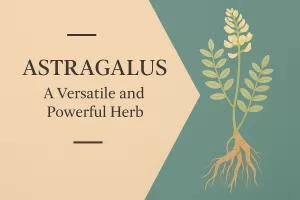
As summer wanes and classrooms fill again, our collective immune systems are asked to rise to the occasion. This is the season when colds and flus ripple through households, and when many people look for herbs that can fortify their defenses. Astragalus membranaceus, a golden root revered in Chinese medicine, is one of the finest immune tonics for this time of year. But what does it actually mean when we say an herb tonifies the body?
What “Tonifying” Really Means
In Chinese medicine, “tonifying” does not mean a quick jolt of stimulation. Rather, it refers to the process of replenishing deep reserves — supporting the body’s ability to produce energy, blood, and immunity over time. Astragalus is a quintessential qi tonic: it works not by suppressing symptoms, but by strengthening the body’s underlying reserves so it can resist imbalance in the first place.
Modern research supports this ancient insight. Astragalus contains polysaccharides and saponins that enhance immune surveillance, modulate inflammatory responses, and improve the function of immune cells such as macrophages and natural killer cells. Instead of forcing the body in one direction, it helps the system return to its own rhythm — like tuning an instrument so it can play in harmony.
Astragalus as an Adaptogen
Adaptogens are plants that help the body adapt to stress, whether physical, emotional, or environmental. Astragalus sits in this category not because it gives a short-lived energy surge, but because it quietly restores balance. In my practice, I notice this especially during seasonal transitions, when many people feel more run down or fatigued as schedules shift and immune demands rise. Astragalus doesn’t push the body — it steadies it, like laying down strong roots so the winds of stress or infection have less power to topple us.
Practical Application
Use Astragalus preventatively rather than waiting until you’re already sick. In fact, avoid it during an active fever or infection; at that point, the body needs to focus its energy on clearing the pathogen, not on building more reserves.
The most traditional way to take Astragalus is simple: simmer slices of the dried root into soups, broths, or teas throughout fall and winter. If you prefer modern preparations, look for capsules or tinctures. A common range is 500–1,000 mg of extract daily, though higher amounts may be appropriate under professional guidance.
Think of Astragalus as part of your seasonal rhythm, like pulling out warmer clothes or adjusting your sleep schedule. Its strength lies in steady, consistent use over time.
A Subtle Form of Resilience
When we speak of fortification, it is tempting to imagine shields and barriers. But Astragalus teaches us another vision of resilience: one rooted in steady nourishment, in deep reserves, in the quiet ability to withstand. To “tone” the body is not to armor it against the world, but to cultivate vitality so it can meet the world more fully.
As school days lengthen and the air grows crisp, this root offers a reminder: strength does not always roar. Sometimes it hums softly beneath the surface, preparing us for the seasons to come.
If this perspective on Astragalus resonates, explore the upcoming posts in this series. I’ll be sharing more on breathwork, energy herbs, stress resilience, and healing environments — all practical ways to support body, mind, and spirit through the seasons. You can also connect with me directly through my website to learn more about how adaptogens might fit into your wellness plan.
Author Note & Disclaimer
I am a doctor of East Asian medicine with clinical and risk management expertise. The information in this article is provided for general educational purposes only. It is not intended as medical advice and should not be used as a substitute for consultation with a qualified healthcare provider. Do not use this information to diagnose, treat, cure, or prevent any health condition. Always seek the guidance of your physician or another licensed healthcare professional before starting, changing, or discontinuing any herbal, dietary, or lifestyle regimen, especially if you are pregnant, breastfeeding, taking prescription medications, or managing a chronic illness.